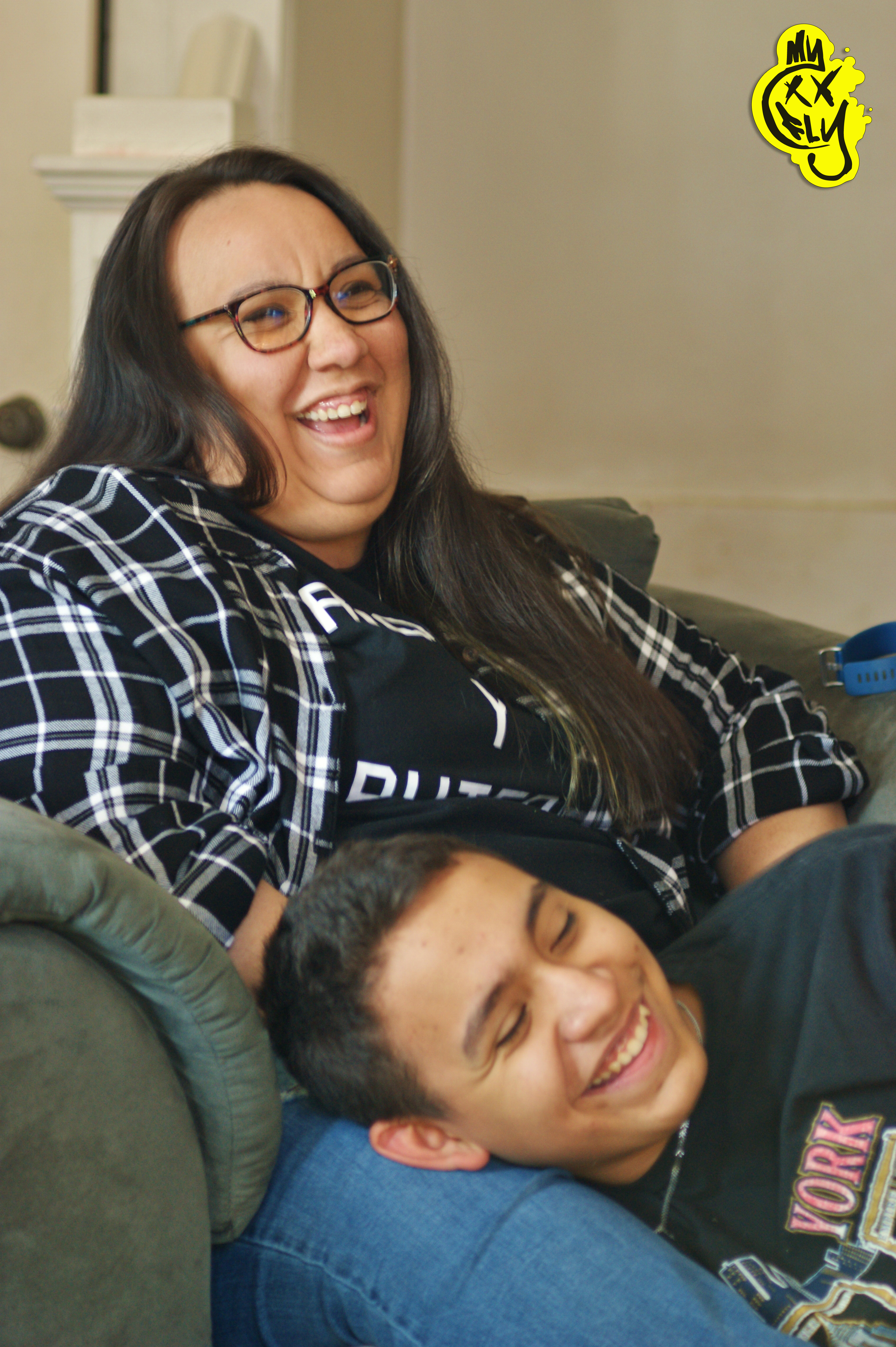Welcome MyXXFam! If you read our MIA to PGH post or watched our road-trip video and found yourself wondering why on Earth the MyXXFLY team settled on Pittsburgh to set up shop, meet Jenny Gonzalez! Our feature babe for the week, the vibrant, fly, and confident af Jenny is one third of our Miami family in Pittsburgh. Along with her husband and son, Jenny relocated North nearly five years ago in a difficult but necessary decision for the good of her family, which may have ultimately saved her life. While she’s still adjusting to Pennsylvania, you can take the girl out of Hialeah but you can’t take Hialeah out of the girl. Jenny stays connected to her Cuban roots through rounds of dominoes, home-cooking and salsa dancing on Sunday mornings. Now, we’ve brought some 305 camaraderie into the neighborhood and have in turn been blessed with a seamless transition into this part of the country because there’s nothing like family to make a new city feel like home.
Today, we’re discussing a topic that every fat person who has ever been to a doctor can relate to, and one that you may have never considered if you are not fat; the effect of weight on diagnosis and treatment in healthcare. Jenny has been living in chronic (and sometimes debilitating) ovarian pain for about a year due to late diagnosis for a non-weight related issue. She is currently waiting on a necessary and fairly routine surgery that due to weight stipulations and unstable healthcare coverage at her workplace has dragged on for much longer than average. Her condition, if left untreated, can lead to complications and even death, but like the thousands of cases across the country where obese patients face discrimination in healthcare, she waits.
Diagnosis
The anxiety associated with visiting the doctor while fat goes far beyond being fat-shamed when you get there (which you almost certainly will face). Research shows that doctor’s on average spend less time with obese patients and more often fail to refer them to follow-up diagnostic testing than smaller patients. The same study found that doctor’s report feel treating obese patients is “a waste of time”, and find them more annoying than other patients.
The prevailing narrative is that an overweight person’s health problems stem solely from his/her weight, and if this person were to simply lose weight, the ailments would go away. Such as the woman reporting sudden shortness of breath who had several life-threatening blod clots in her lungs but was told she just needed to lose weight. Or the woman complaining of hip-pain who was told to go on a diet (after she’d already lost 70 lbs) but actually had progressive scoliosis, a condition not caused by weight at all. These cases are the norm rather than the exception. The gross over-simplification of illness and callousness within the healthcare system toward fat people sends the message that a fat life is simply not as valuable as a thin one.
How many of us have had our pain dismissed due to our size, been shamed for our weight by a doctor, or avoided healthcare altogether because we know it will inevitably end in being told to diet? Jenny experienced sub-par care in Miami for years due to weight-stigma in healthcare, and it wasn’t until moving to Pennsylvania (after her third trip to the emergency room) that she was diagnosed. If you cannot relate to this treatment due to your size, ask a fat friend about their experiences within the healthcare system and prepare yourself for a number of depressing and/or enraging accounts. Doctor bias leads to the alienation of obese patients with treatable weight-related illness, and adds to the needless suffering of obese patients with non-weight related illnesses.
Treatment
Even when diagnosed, treatments for obese patients are not as effective and experts are almost certain this is because medical care is compromised. Doses are given for a “standard size” which is often based on data from decades ago when the average person was thinner, and research on treatments for obese patients is simply not done. One national survey found that at least 90 percent of emergency rooms do not have CT or MRI scanners that can fit very heavy people. When a morbidly obese patient cannot fit into a standard scanner, doctors may look for alternative less accurate measures, or may simply give up.
Doctor’s and hospitals routinely use arbitrary (as there is no industry standard) Body Mass Index scores as cutoffs, before giving patients the option for life-changing treatments or surgeries which was a stipulation in Jenny’s case. This means that patients are sometimes outright denied care (and even consultations) based on weight, or are required to lose weight before treatment. Complications for obese patients may arise from a number of reasons including insufficient knowledge on proper doses of anesthesia, but since there is very little research being done, there are no clear answers. Dr. Adolph Yates, an orthopedics professor at the University of Pittsburgh school of medicine who regularly treats and operates on obese patients posits the reason behind BMI cutoffs has more to do with a hospitals rating than anything else. If ratings fall due to patients having complications, this reduces reimbursements by Medicare and may also lead to financial penalties for the hospital and its doctors. A recent survey of over 700 surgeons found 62% used BMI cutoffs, and 42% said they had done so to protect performance scores. This practice means hospitals favor “low-risk” patients, effectively discriminating against those who are not “healthy” enough to be treated.
Addressing Fatphobia
Fatphobia is the hatred of fat bodies or the fear of “fatness”. Fatphobia perpetuates negative stereotypes and leads to discrimination and violence against fat people. On an individual scale we can fight fatphobia by checking our own judgements and biases. What language do we use internally when we gain a few pounds? How have we internalized hatred for fat bodies? What do we assume about a fat person’s health? On a larger scale we must politicize the discussion and look for ways to improve the social and physical environments for the most vulnerable populations by investing in local community efforts and non-profits. It has been argued that it is poverty and not individual choice that is driving the rising levels of obesity in the United States. The correlation between poverty and obesity shows that those with low income and education levels, are at a higher risk. Even when a fat person is fortunate enough to receive proper diagnoses for an ailment, our failing healthcare system means we may be priced out of treatment. For Jenny, this has meant living with pain and risking complications because prompt surgery is simply not affordable.
Living in a fatphobic society means that your life is not worth the same as your thin counterpart. It means that you have to be more diligent about doing your own research, advocating for yourself, and getting multiple opinions because possibly, in the eyes of your practitioner, your fat body precludes you from receiving thorough and thoughtful healthcare. This is an ugly reality but it is not hopeless! Do not be afraid to voice your concerns to your healthcare provider so that you may find the right practitioner for you, utilize resources as they become more readily available, and ask for help and empathy from friends and loved ones when you need it, no matter your size! Doctor’s wield power in society and in medical settings, but being dismissed for our ailments or shamed for our size is not something we should ever allow.
We’d like to thank our homegirl Jenny for joining us today and will be right by her side as she continues on her journey toward treatment and subsequent recovery. Friendship is an incredible gift, and we are so grateful for hers. Have you ever been discriminated against in healthcare? Did you learn something new today? Until next time, share your thoughts in the comments below, stay connected with us throughout the week via instagram, facebook, and twitter, and keep your double-x fly!








You ROCK Jeny G. Love you to the moon and back.
Your Miami familia misses you.
I have SO many examples of this in my life, including a very recent and humiliating incident. I’m happy to share.
I’m glad it resonated with you Angel! And I’m sorry at the same time, if you ever want to chat about it I’m here for you girl 💗